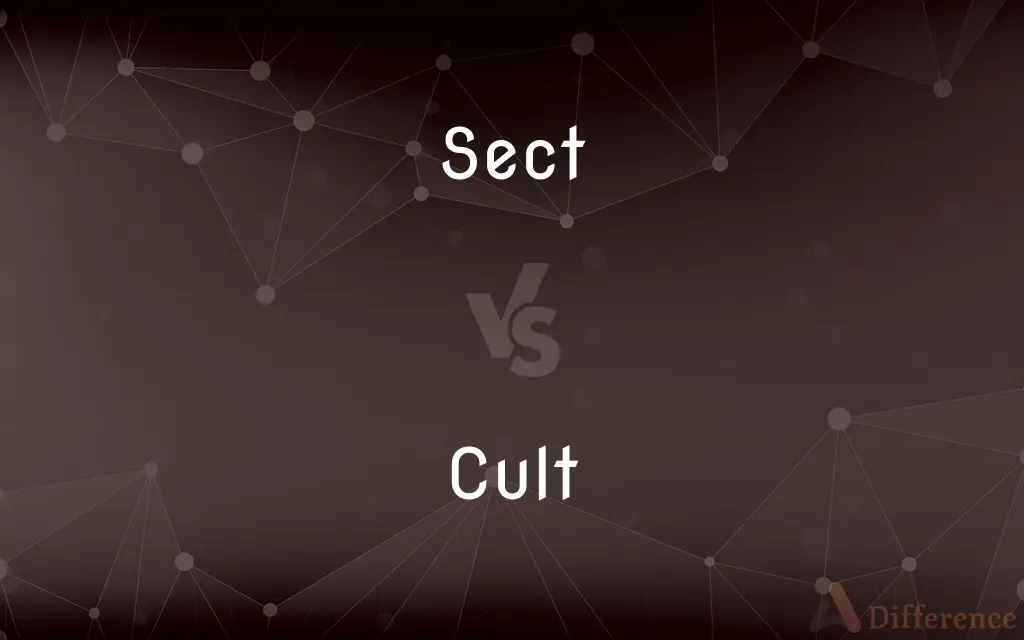Sect vs. Cult — What's the Difference?
By Tayyaba Rehman — Updated on September 28, 2023
Sect is a subgroup of a religious, political, or philosophical belief system, often breaking from larger groups. A Cult typically refers to a social group defined by its religious, spiritual, or philosophical beliefs, often seen as extreme or dangerous.

Difference Between Sect and Cult
Table of Contents
ADVERTISEMENT
Key Differences
A sect is usually a distinct subgroup that has broken away from a larger religious organization, typically due to differences in beliefs or practices. They retain similar doctrines to the parent group but may have different interpretations or emphases. Sects often form when members of a religious community feel that the mainstream organization has deviated from the original, “true” teachings or beliefs.
Conversely, a cult is generally a group exhibiting excessive devotion to a person, idea, or thing and employing unethical manipulative or coercive techniques to persuade and control members. Cults usually center around a charismatic leader who demands absolute loyalty and commitment from followers. The term "cult" often carries negative connotations and is associated with unconventional beliefs and practices, sometimes even dangerous or illegal activities.
In comparison to sects, cults can exhibit more radical beliefs and practices and often have little or no connection to mainstream religious organizations. While sects generally operate within the boundaries of larger religious traditions and maintain a semblance of doctrinal continuity, cults tend to be more isolative, secretive, and doctrinally innovative or heterodox.
While sects usually seek religious legitimacy and may engage in dialogue or debate with the broader religious community, cults are more likely to be dismissive of external criticism and may discourage members from questioning or leaving the group. The impact of cult involvement can be profound, affecting individuals psychologically, emotionally, and sometimes physically, due to the group's extreme beliefs and practices.
It’s crucial to acknowledge that the use of the term “cult” is often controversial and subjective. In contrast, sects, being less radical and more connected to mainstream religion, are generally more accepted and understood within the larger context of religious diversity.
ADVERTISEMENT
Comparison Chart
Definition
A subgroup breaking from a larger religious group.
A group with extreme or unconventional beliefs or practices.
Connotation
Less negative, more doctrinally connected to religion.
Generally negative, often associated with manipulation.
Leader
May or may not have a distinct leader.
Typically has a charismatic leader.
Beliefs
Relatively closer to the parent group.
More radical, innovative, or heterodox.
Social Perception
Seen as part of religious diversity.
Often seen as isolative, secretive, and potentially dangerous.
Compare with Definitions
Sect
A dissenting or schismatic religious body; especially one regarded as extreme or heretical.
The sect was eventually condemned by the mainstream church for its radical beliefs.
Cult
A relatively small group of people having religious beliefs or practices regarded by others as strange or sinister.
People were becoming concerned about the cult’s influence in the region.
Sect
A religious denomination.
Each sect had its unique rituals and traditions.
Cult
A system of religious veneration directed toward a particular figure or object.
The cult of the leader was growing among the disaffected youth.
Sect
A group adhering to a distinctive doctrine or leader.
Followers of the sect were deeply committed to its principles and teachings.
Cult
A social group defined by its religious, spiritual, or philosophical beliefs, or its common interest in a particular personality, object, or goal.
The cult was attracting followers from around the world with its compelling message.
Sect
A subgroup that forms due to differences in beliefs or interpretations from a larger religious group.
The group declared itself a new sect after doctrinal disagreements with the church leaders.
Cult
A community or society that is in some way abnormal or sinister, typically isolating themselves from mainstream society.
Rumors were circulating about a cult operating in secrecy in the remote hills.
Sect
A sect is a subgroup of a religious, political, or philosophical belief system, usually an offshoot of a larger group. Although the term was originally a classification for religious separated groups, it can now refer to any organization that breaks away from a larger one to follow a different set of rules and principles.
Cult
In modern English, a cult is a social group that is defined by its unusual religious, spiritual, or philosophical beliefs, or by its common interest in a particular personality, object, or goal. This sense of the term is controversial, having divergent definitions both in popular culture and academia, and has also been an ongoing source of contention among scholars across several fields of study.
Sect
A group of people forming a distinct unit within a larger group by virtue of certain refinements or distinctions of belief or practice.
Cult
A system of religious veneration and devotion directed towards a particular figure or object
The cult of St Olaf
Sect
A religious body, especially one that has separated from a larger denomination.
Cult
A person or thing that is popular or fashionable among a particular group or section of society
A cult film
The series has become a bit of a cult in the UK
Sect
A faction united by common interests or beliefs.
Cult
A religion or religious sect generally considered to be extremist or false, with its followers often living in an unconventional manner under the guidance of an authoritarian, charismatic leader.
Sect
An offshoot of a larger religion or denomination, usually and especially one with unorthodox or extreme political and/or religious beliefs.
A religious sect
Cult
The followers of such a religion or sect.
Sect
A group following a specific ideal or a leader.
Cult
A system or community of religious worship and ritual.
Sect
(obsolete) A cutting; a scion.
Cult
The formal means of expressing religious reverence; religious ceremony and ritual.
Sect
A cutting; a scion.
Cult
A usually nonscientific method or regimen claimed by its originator to have exclusive or exceptional power in curing a particular disease.
Sect
Those following a particular leader or authority, or attached to a certain opinion; a company or set having a common belief or allegiance distinct from others; in religion, the believers in a particular creed, or upholders of a particular practice; especially, in modern times, a party dissenting from an established church; a denomination; in philosophy, the disciples of a particular master; a school; in society and the state, an order, rank, class, or party.
He beareth the sign of poverty,And in that sect our Savior saved all mankind.
As of the sect of which that he was born,He kept his lay, to which that he was sworn.
The cursed sect of that detestable and false prophet Mohammed.
As concerning this sect [Christians], we know that everywhere it is spoken against.
Cult
Obsessive, especially faddish, devotion to or veneration for a person, principle, or thing.
Sect
A subdivision of a larger religious group
Cult
The object of such devotion.
Sect
A dissenting clique
Cult
An exclusive group of persons sharing an esoteric, usually artistic or intellectual interest.
Cult
A group, sect or movement following an unorthodox religious or philosophical system of beliefs, especially one in which members remove and exclude themselves from greater society, including family members not part of the cult, and show extreme devotion to a charismatic leader.
Two former cult members explain the difficulties they had extricating themselves from it.
Cult
The veneration, devotion, and religious rites given to a deity (especially in a historical polytheistic context), or (in a Christian context) to a saint.
The cult of Apollo
The cult of Mary
Cult
(informal) A group of people having an obsession with or intense admiration for a particular activity, idea, person or thing.
The heavy metal cult; the cult of basketball; the guitarist's cult of loyal fans; the cult of celebrity
Cult
Of or relating to a cult.
Cult
Enjoyed by a small, loyal group.
A cult horror movie
Cult
Alternative form of kvlt.
Cult
Attentive care; homage; worship.
Every one is convinced of the reality of a better self, and of the cult or homage which is due to it.
Cult
A system of religious belief and worship.
That which was the religion of Moses is the ceremonial or cult of the religion of Christ.
Cult
A system of intense religious veneration of a particular person, idea, or object, especially one considered spurious or irrational by traditional religious bodies; as, the Moonie cult.
Cult
The group of individuals who adhere to a cult (senses 2 or 3).
Cult
A strong devotion or interest in a particular person, idea or thing without religious associations, or the people holding such an interest; as, the cult of James Dean; the cult of personality in totalitarian societies.
Cult
Adherents of an exclusive system of religious beliefs and practices
Cult
An interest followed with exaggerated zeal;
He always follows the latest fads
It was all the rage that season
Cult
A system of religious beliefs and rituals;
Devoted to the cultus of the Blessed Virgin
Cult
A misplaced or excessive admiration for a particular person or thing.
The cult of celebrity was pervasive in the media-driven society.
Common Curiosities
What is a sect?
A sect is a subgroup, typically breaking from larger religious groups due to differing beliefs or practices.
What is a cult?
A cult is usually a group with extreme beliefs or practices, often centered around a charismatic leader.
Can a sect become mainstream?
Yes, some sects can gain followers and acceptance, becoming mainstream or forming new religious movements.
Are cults always religious?
No, cults can form around various focuses, including personalities, philosophies, or other interests.
Do sects and cults have leaders?
Sects may or may not have distinctive leaders, but cults typically have a charismatic leader at the center.
Can sects and cults be found in all religions?
Sects and cult-like groups can potentially arise in any religious tradition, depending on differing beliefs and practices within the larger group.
Are all cults dangerous?
While many cults can be harmful due to extreme beliefs and practices, not all are inherently dangerous.
Can sects have a positive impact on society?
Some sects may contribute positively to societal diversity and enrichment by promoting alternative perspectives and values.
Can people leave cults easily?
Leaving a cult can be challenging due to psychological, emotional, and sometimes physical constraints imposed by the group.
Are all sects negative or harmful?
Not necessarily; some sects may simply have different interpretations or practices within the same religious tradition.
Can sects be large in number?
Yes, some sects can have substantial numbers of adherents, depending on their appeal and teachings.
Do sects seek to isolate their members?
Not necessarily; while some sects may prefer isolation, others may remain engaged with the wider community.
How does a cult control its members?
Cults often employ manipulative or coercive techniques, including isolation, indoctrination, and emotional dependency, to control members.
Is it easy to identify a cult?
Cult identification can be subjective and controversial, depending largely on societal norms and perceptions.
How does society usually view cults?
Cults are often viewed with suspicion or concern due to their unconventional or extreme beliefs and practices.
Share Your Discovery

Previous Comparison
Fistula vs. Sinus
Next Comparison
Colin vs. QuailAuthor Spotlight
Written by
Tayyaba RehmanTayyaba Rehman is a distinguished writer, currently serving as a primary contributor to askdifference.com. As a researcher in semantics and etymology, Tayyaba's passion for the complexity of languages and their distinctions has found a perfect home on the platform. Tayyaba delves into the intricacies of language, distinguishing between commonly confused words and phrases, thereby providing clarity for readers worldwide.















































